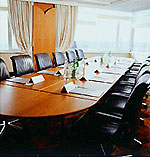Moscow business conference explores competitiveness

(Moscow News – themoscownews.com – Maria Stambler- June 28, 2013) Few doubts exist as to what needs to rank high on Russia’s economic agenda: growth and competitiveness in a healthy and transparent business climate. The ongoing discussions in the government and the business community revolve around how to achieve them.
At the annual economic forum in St. Petersburg on June 21, President Vladimir Putin outlined the foundations necessary to foster economic expansion, encouraging entrepreneurship and developing infrastructure.
In the context of a meeting of the Global Federation for Competitive Councils in Moscow this week, a director at one of Russia’s representative organizations in the GFCC conceded infrastructure’s importance in the country’s development, but offered some cautions.
“Infrastructure is a priority, but no less important is the strategic planning of infrastructure and staying within reasonable costs,” Alexei Prazdnichnykh, managing director of the Eurasia Competitiveness Institute – a not-for-profit think tank with a focus on competitiveness, prosperity and economic integration in the Eurasia region – told The Moscow News. “Unfortunately, some infrastructure projects can cost so much that they may not boost anything in the end.”
At risk of corruption
While Prazdnichnykh, also a partner at the Strategy Partners Group consulting firm, believes that the projects are achievable, the risks lie mainly in the efficiency of government spending and in corruption. The latter in particular is seen as the most serious impediment to completing projects and doing business in Russia, he said, citing the findings of the ECI’s 2011 Russia Competitiveness Report.
The report found that corruption and undue influence were among the major burdens faced by Russia’s businesses. Most of the irregular payments were associated with awarding public contracts, which may cast doubts on the success of Putin’s proposed infrastructure projects, especially since the report used the cost of building roads in different countries as a measure to assess levels of corruption.
“Other problems also exist but they are of a more technical nature – for example quality of professional education, access to financial resources, etc.,” Prazdnichnykh said. “In our report, we found that there is a pervasive stereotype within society that we’ll never get rid of corruption. It’s like a sickness that will only go away once society becomes wealthier and people stop supporting corrupt behavior.”
International experience shows that corruption and influence are obstacles to growth and prosperity, but they can be solved through decreasing the government’s role in decision-making and establishing structures to punish corrupt officials, he said.
Flavors from around the world
Prazdnichnykh emphasized the importance of international models for finding solutions to Russia’s problems in its business climate, since “the world is full of recipes.”
“Russia’s problems are specific but we can – and should – look for solutions and ideas in other countries,” he said. “Brazil can teach us how to develop agriculture, South Korea has some of the most effective governance structures, the United Arab Emirates shows us how to create the necessary infrastructure and build truly international and truly competitive cities. The United States has built the most innovative and entrepreneurial economy. Every country has ideas that would be useful for Russia.”
This is exactly why Prazdnichnykh is so proud of his organization being part of the GFCC, and hosting its conference this year.
“The main aim of this event is to gain access to the best international experience and expertise,” he said. “The people that gather here are not academics, but, rather, practitioners that influence politics of other countries and improve overall competitiveness.”
Still, looking to other nations for ideas is not something new for Russia, going back as far as the 18th century. Prazdnichnykh singled out St. Petersburg as perhaps one of the best examples of calling upon foreign expertise to create something so impressive.
“Russia should absorb all the best that other countries have to offer and only then can it prosper and be truly competitive,” he said. “Russia was more globalized before the revolution, so we’re not inventing anything new – we just need to look at what we were doing many years ago.”
A two-way street
Exchanging ideas internationally is a two-way street, however, and Prazdnichnykh believes that the work of the ECI is instrumental in improving Russia’s image and promoting its ideas abroad.
“Maybe it’s not so noticeable, but the ECI is playing an important role in improving Russia’s image in influential circles,” he said. “Speaking with leaders from other countries, we demonstrate our experience and our competence, thus improving Russia’s reputation and increasing a desire to do business with Russia.”
However difficult it may be to remain optimistic, positive sentiments are central to the ECI’s success.
“Pessimism kills initiative,” he said. “Our foreign colleagues tend to be more positive – it rubs off on us and motivates to keep doing our work and do it even better.”
